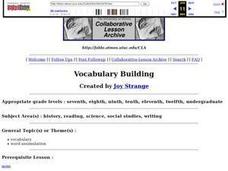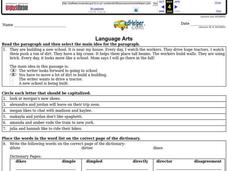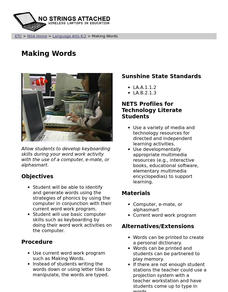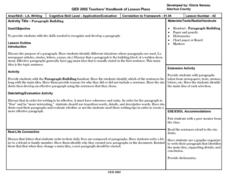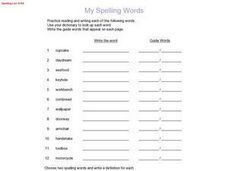Curated OER
Vocabulary Building - Declaration of Independence
Young scholars read the first part of the Declaration of Independence and mark the words they don't know. First, they try to guess what the words mean by looking at the them in context, and then they look up the words in a dictionary.
Curated OER
Language Arts
In this literacy worksheet, 5th graders practice putting the sentences into the proper grammar structure, using the correct punctuation, and finding the definitions in the dictionary.
Curated OER
Split Suffixes
Make new words by adding suffixes to word beginnings. There are four suffixes here: -ible, -able, -ive, and -ion. After using them to complete five given words, they use their vocabulary skills to apply the suffixes to words they think...
Curated OER
Analogies
Middle schoolers answer seven analogy questions using their problem solving and vocabulary skills to discover how various words are related. Pupils are encouraged to use a dictionary as needed.
Curated OER
Vocabulary Building Through Visualization of Word Meanings to Create Digital Art
Use online dictionaries to define vocabulary words and create a visualization of word meanings through digital art. Middle schoolers go online to define assigned vocabulary words. They visualize the meanings of the words in photo...
Curated OER
Making Words
Young writers identify and generate words using the strategies of phonics on the Making Words computer program. Words are typed instead of having to use tiles or paper. Extension activities such as playing the memory game, drawing...
Curated OER
Guided Reading Organizer for Chain Reaction
The class uses Chain Reaction, a magazine, to build a better understanding of Latin and Greek roots found in scientific vocabulary. They use two attached worksheets to help them read a scientific article, using visual clues and their...
Curated OER
100 Questions
Gather around to play a game! Middle and high schoolers answer questions (provided here) using various reference materials. Bring encyclopedias and other reference materials to class, as each group has limited Internet access! An answer...
Curated OER
Paragraph Building
Build the skills your budding authors need to develop to compose well-structured paragraphs. Give them the topic sheet (included here), and have them write a cohesive paragraph using the ideas listed. Consider having them include two...
Curated OER
Literature Study Guide: Gulliver's Travels
Although the title suggests this resource is devoted to Gulliver’s Travels, the materials and templates can be used with any work of literature. Readers fill out a reading schedule chart, write a summary, keep a vocabulary word list, and...
Curated OER
Totally Trivial - "A"
High school high schoolers can hone their research skills by utilizing the Internet to find the answers to the trivia questions presented in this on-line worksheet. All sorts of questions are posed: everything from questions about famous...
Curated OER
Conversations about childhood
Encourage your class to discuss their childhood with other classmates using the six questions listed here. After sharing their answers, learners write a paragraph detailing general information about their childhood. This plan is designed...
Curated OER
Analogies
In this analogy worksheet, learners answer seven questions using their problem solving skills and vocabulary skills to discover how words are related to each other. Students are encouraged to use dictionaries.
Curated OER
Analogies
In this analogy instructional activity, students answer seven questions using their problem solving skills and vocabulary skills to discover how words are related to each other. Students are encouraged to use dictionaries.
Curated OER
The Secret School
Fourth graders make predictions and go over vocabulary for the story The Secret School. In this reading lesson plan, 4th graders use comprehension skills as they read the story and have to read to them.
Curated OER
Abridged and Unabridged Dictionaries
Students perform research into the history and formation of the English Language. The use of multiple types of activities is used for application of the theory of Multiple Intelligences.
Curated OER
How Can We Keep Our Forests Intact and Have Our Chocolate Too?
Fourth graders explore various methods of growing and harvesting rainforest foods in order to sustain its biodiversity. They discuss the various uses for trees from several viewpoints. Students research chocolate demand and land use...
Curated OER
Workplace Vocabulary
High schoolers engage in daily spelling and vocabulary practice of workplace-related terms with definition matching exercises, word scrambles, dictation, sentence writing. Finally, they compose a short essay in which they use the words...
Curated OER
My Spelling Words: Spelling List #186
Learning to use the dictionary is a long-term investment in good spelling. scholars practice writing compound nouns, look them up in the dictionary, and write the guide words from the dictionary page where they were found. I'd extend it...
Curated OER
Olympic Shadow Boxes
What a cool way to incorporate art and use reference materials. Learners use classroom reference materials such as almanacs, encyclopedias, and dictionaries to answer one of four questions, and then they use the information to create a...
Curated OER
Whole Language Approach to Map Making
Fifth graders, after reading Island of the Blue Dolphins, explore map making using the Whole Language Approach.
Curated OER
Time Capsule: Oral Presentation
A great way to gain proficiency when learning a new language is to prepare an oral presentation. In this foreign language lesson, pairs collaborate to develop a Time Capsule which they present to their class using their target language.
Brigham Young University
The Giver: Magic Squares
Combine math and vocabulary in a fun activity based on Lois Lowry's The Giver. Before kids begin the book, they look up the definitions of 16 vocabulary words and complete a puzzle that will give them the same number.
Curated OER
Understanding and Using Primary and Secondary Sources in History
Explore primary and secondary sources in this historical analysis lesson. Young researchers define the terms primary source and secondary source. They read a primary source document provided by the teacher and answer questions about the...


